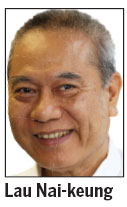John Tsang the Marxist drops the hint
Updated: 2013-03-05 06:30
By Lau Nai-keung(HK Edition)
|
|||||||
What is right or wrong in Hong Kong is determined by nothing but some people's feelings, and if they feel good about something, that must be right. Some call it democracy, I call it populism. Like it or not, John Tsang Chun-wah is a middle class, and a lot of those who think they are middle class belong rather to the working class. Our collective failure to make this straight is not only unfair to John, but will also prevent us from solving our real problems.
John earns more than HK$300,000 a month and lives in a luxury house courtesy of taxpayers. On top of these, he enjoys numerous perks, benefits and a generous retirement fund. No matter what his "lifestyle" is - that he lives frugally or extravagantly - his job gives him a life the majority of us cannot even dream of. But still, whether he is a middle class or not is a matter of theory, not our sense of justice.
You can define the middle class in relative terms as the middle income range of each country. An influential exponent of this approach was Lester Thurow of the Massachusetts Institute of Technology's Sloan School of Management, who took as his reference point the median income in the United States - where there is an equal number of people above and below the line - and defined the American middle class as the group with incomes lying between 75 percent and 125 percent of the median. Bill Easterly of New York University selected those who were in the three middle quintiles of income (leaving out the poorest 20 percent and the richest 20 percent). This approach is neat and can be applied across different countries, and is therefore favored by the mainstream media such as The Economist.

If we use this approach, John is definitely in the richest class here. In 2011, the local median monthly domestic household income was HK$20,200. Leaving aside the issue of benefits, John's monthly income is 1,496 percent of median income, way above the 125 percent ceiling. Government statistics also give us median monthly income from main employment by deciles of working population. The number is HK$51,750 for the 10th decile group (the group with highest income), meaning that the richest 10 percent of working people in Hong Kong has a median monthly income of that amount. John is in the top 5 percent, outside of the three middle quintiles.
So is he after all not a member of the middle class? Not if he is a Marxist. In Marxism, which defines social classes according to their relationship with the means of production, the middle class is said to be the class below the ruling class and above the proletariat in the Marxist social schema. Marxist writers have used the term in two distinct but related ways. In the first sense, it is used for the bourgeoisie, the urban merchant and professional class that stand between the aristocracy and the proletariat in the Marxist model.
However, in modern developed countries, the bourgeoisie is taken to be the class that owns and controls the means of production, and is thus considered the ruling class in capitalist societies. As such, some Marxist writers specify the petite bourgeoisie - owners of small property who may not employ wage labor - as the "middle class" between the ruling and working classes. No matter how rich John is, our financial secretary is still a wage labor in every sense of the word.
But of course John cannot refer to Marx, or for that matter even to The Economist, as the government's official definition of middle class is a citizen with a monthly income of between HK$10,000 and HK$40,000.
Assuming you and your partner each earn HK$30,000 a month, your household income of HK$60,000 will be well above the median of HK$20,200. According to The Economist, you are a middle class, but why are you still complaining and asking for "candies" from the government?
The term of middle class only makes sense in certain specific social settings. The concept that people with median income would be living cozily can only be applicable to a society where income is relatively evenly distributed and that money does not easily come in or go out of the boundary.
John the Marxist has already given us the hint. We should tell the government that we are poor, not that we belong to a "middle class" that need constant and recurring subsidy. We should stop the pretence and admit that we are screwed, and that the financial and real industries have not created the good jobs that we think they should. That would be the first step towards a constructive dialogue.
The author is a member of the Commission on Strategic Development.
(HK Edition 03/05/2013 page1)